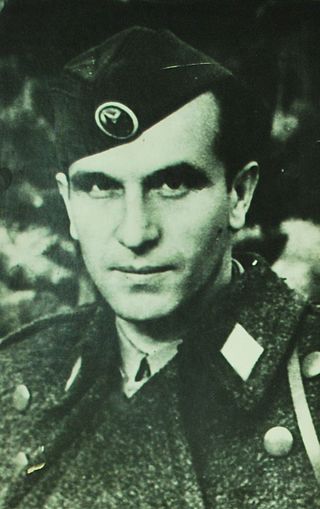Mihailo Apostolski
From Wikipedia, the free encyclopedia
Mihailo Apostolski (Macedonian: Михаило Апостолски; Bulgarian: Михаил Митев Апостолов;[2] Serbian: Михаило Митић, romanized: Mihailo Mitić;[3][page needed] November 8, 1906 – August 7, 1987) was a Macedonian general, partisan, military theoretician, politician, academic and historian. He was the commander of the General Staff of the National Liberation Army and Partisan Detachments of Macedonia,[1][4][page needed] colonel general of the Yugoslav People's Army, and was declared a People's Hero of Yugoslavia.
Mihailo Apostolski | |
|---|---|
 | |
| Native name | Михаило Апостолски |
| Born | November 8, 1906 Novo Selo, Ottoman Empire |
| Died | August 7, 1987 (aged 80) Dojran, SFR Yugoslavia |
| Allegiance | Kingdom of Yugoslavia; SFR Yugoslavia |
| Rank | Colonel General |
| Known for | Commander of the Headquarters of the People's Liberation Army and Partisan detachments in Macedonia during World War II.[1] |
| Alma mater | Military Academy, Kingdom of Yugoslavia |
| Spouse(s) | Cveta Apostolska |
Life
Summarize
Perspective
Early life
Apostolski was born Mihail Mitev Apostolov[5] in Novo Selo, in the Kosovo vilayet of the Ottoman Empire (now North Macedonia), in a Bulgarian Exarchist family to Mite Apostolov and Vasa Apostolova.[1][4] He attended primary and secondary school in Štip. In 1927, he graduated from the Military Academy in Belgrade, capital of Kingdom of Yugoslavia. In 1933, he graduated from the High Military Academy, and in 1938 he graduated from the Commanding Academy as a major.
During World War II
During the invasion of Yugoslavia in April 1941, he was a commander of the alpine units of the Royal Yugoslav Army in Ljubljana.[6] According to another report, he was a general staff officer in charge of the railway transport.[7] At that time he was in Belgrade.[8] After the capitulation of Yugoslavia and the subsequent occupation of Vardar Macedonia, Apostolski returned to Ljubljana, where was captured by the Italian army and was taken to the camp Vestone. Shortly after, his father, a First World War Bulgarian army veteran, petitioned the Bulgarian Minister of War to help release Apostolski.[9]
After being released from prison, Apostolski received a certificate that he was a "trustworthy Bulgarian".[10][11] Later he filed an application for appointment in the Bulgarian army.[12] He was offered the rank of captain, however he refused.[9][13] Later, General Konstantin Lukash, interceded for him, looking for a job in the Bulgarian State Railways' system, but without success.[14] Afterwards, Apostolski entered the Sofia University, where he conducted underground work.[15] In April 1942, he became a member of the Communist Party of Yugoslavia, and in June the same year he was appointed commander of the General Staff of the National Liberation Army and Partisan Detachments of Macedonia. In May 1943, he was promoted to Major General. During the Second Session of Anti-Fascist Council for the National Liberation of Yugoslavia (AVNOJ) he became a member of the Presidency of AVNOJ. In addition to the Macedonian brigades operating under his command, in February 1944, he commanded the brigades from Kosovo and Southern Serbia. He became a member of the Initiative committee for the organization of the Antifascist Assembly of the National Liberation of Macedonia (ASNOM). He participated in the First Session of the ASNOM and was elected to its presidency.[1]


After World War II

In 1995, the Military Academy in Republic of Macedonia was named "General Mihailo Apostolski". After the Second World War Apostolski became one of the military leaders of the new Socialist Federal Republic of Yugoslavia (SFRY). After the end of his active military service, he began intensively dealing with the history of the Macedonian nation. From 1965 to 1970, he was the head of the Institute of National History in Skopje, SR Macedonia. He was accused by Bulgarian historians of systematically falsifying history and in the use of hate speech against Bulgaria and the Bulgarian people.[16] On that occasion Apostolski became famous among Bulgarian historians with his phrase: "I have no evidence, but I claim it".[17] He was actively involved in the formation of the Macedonian Academy of Sciences and Arts, of which he was member of since its creation. He was also its president from 1976 to 1983.[1] He was also a member of:
- Serbian Academy of Sciences,
- Yugoslav Academy of Sciences and Arts (now: Croatian Academy of Sciences and Arts),
- Academy of Sciences and Arts of Bosnia and Herzegovina and
- Academy of Sciences and Arts of Kosovo.
He died on August 7, 1987, in Dojran, SR Macedonia, SFR Yugoslavia.[1][4]
Legacy
His birthplace, the House of Mihajlo Apostolski, is recognized as a protected object of Cultural Heritage of North Macedonia.[18]
References
External links
Wikiwand - on
Seamless Wikipedia browsing. On steroids.
